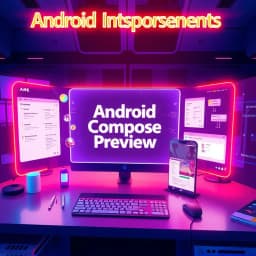
Android Compose Preview Generator
Find this useful? Bookmark ( CTRL/CMD + D ) for quick access!
Try an example:
UI Component Previews
Themed Layout Samples
Dynamic State Visualizations
Responsive Design Testing
Dark Mode Comparisons
Animation Effect Demos
Explore Similar Tools
Recent Generations
Taco Bar Party Ideas
the amount paid directly to you. Yes it is possible in future cases to request direct payment to the provider, Rephrase and give me polished email.
Claim Email Template
we have processed the claim as per the attachments in the claim submission we have processedthe invoice for Saul Holding. We dont have invoice for the Salofalk.
Claim Email Template
this additional information is very important. this adiitional information was requested by our clinical team. Without clinical review claim not be paid so please share the below additional information
Android Compose Preview Generator
Android Compose Preview Generator is a powerful AI-driven tool designed to streamline the development of Android applications using Jetpack Compose. This innovative solution combines seamless integration with Android Studio and automated preview generation to deliver a more efficient and visually appealing design process.
Key Capabilities
- Automated Preview Generation: Instantly create UI previews for your Compose components, saving time and reducing manual effort.
- Real-time Updates: Experience live updates as you modify your code, allowing for immediate visual feedback and faster iterations.
- Customizable Themes: Easily apply and switch between different themes to see how your UI adapts, enhancing design flexibility.
- Error Detection: Identify and resolve layout issues quickly with built-in error detection, ensuring a smoother development experience.
Who It's For
Designed for Android developers and UI/UX designers, Android Compose Preview Generator excels in creating intuitive and responsive interfaces. Whether you're building a new app from scratch or enhancing an existing one, this tool streamlines your workflow and enhances productivity.
Why Choose Android Compose Preview Generator
What sets Android Compose Preview Generator apart is its ability to integrate seamlessly with Android Studio, making it the ideal solution for developers looking to optimize their design process and improve collaboration between design and development teams.
Ready to transform your Android app development? Start using Android Compose Preview Generator today and experience the difference in your design workflow!
Enhance Your Work with Android Compose Preview Generator
Leverage the power of AI to streamline your tasks with our Android Compose Preview Generator tool.
Instant Previews
Generate real-time previews of your Android UI components, allowing for immediate visual feedback during development.
Code Integration
Seamlessly integrate with your existing codebase, enabling easy access to preview functionalities directly within your development environment.
Customizable Themes
Easily customize and switch between different themes and styles to see how your UI adapts to various design requirements.
How Android Compose Preview Generator Works
Discover the simple process of using Android Compose Preview Generator to improve your workflow:
Import Your Design Files
Begin by importing your design files into the Android Compose Preview Generator for processing.
Customize Preview Settings
Adjust the settings for your previews, including themes, device types, and orientations.
Generate Previews
Run the generator to create live previews of your Android Compose UI components.
Review and Export
Examine the generated previews and export them for use in your development workflow.
Use Cases of
Android Compose Preview Generator
Explore the various applications of Android Compose Preview Generator in different scenarios:
Rapid UI Prototyping
Quickly generate and visualize UI components in Android applications, allowing designers and developers to iterate on user interfaces without the need for extensive coding.
Real-time Design Feedback
Provide immediate visual feedback on design changes in Android apps, enabling teams to collaborate effectively and make informed decisions during the development process.
Component Library Visualization
Create a visual representation of reusable UI components in a library, helping developers to understand and utilize existing components efficiently.
Cross-Device Compatibility Testing
Preview how Android UI components will appear on different screen sizes and resolutions, ensuring a consistent user experience across various devices.
Who Benefits from Android Compose Preview Generator?
AI-Powered Efficiency
From individuals to large organizations, see who can leverage Android Compose Preview Generator for improved productivity:
Android Developers
Streamline the UI design process with instant previews of Compose layouts.
UI/UX Designers
Quickly visualize design concepts and iterate on user interfaces.
Quality Assurance Teams
Efficiently verify UI components and ensure design consistency across applications.
Educators and Trainers
Teach Android development concepts with practical, hands-on examples using Compose.
Frequently Asked Questions
What is the Android Compose Preview Generator?
The Android Compose Preview Generator is a tool designed to automatically generate previews for Jetpack Compose UI components, allowing developers to visualize their designs without running the app.
How does the preview generation process work?
The tool analyzes your Compose code and generates a visual representation of the UI components. It uses predefined parameters and themes to create accurate previews that reflect the actual design.
Can I customize the previews generated by the tool?
Yes, you can customize the previews by adjusting parameters such as size, theme, and specific states of the UI components. This allows you to see how your UI will look under different conditions.
Is the Android Compose Preview Generator compatible with all versions of Android Studio?
The tool is compatible with Android Studio versions that support Jetpack Compose. It is recommended to use the latest version of Android Studio for the best experience and features.
Do I need any special setup to use the Android Compose Preview Generator?
No special setup is required beyond having Jetpack Compose integrated into your project. Simply install the tool and start generating previews directly from your Compose code.
































